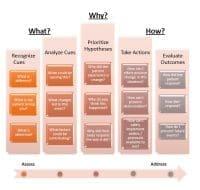A new study from Nature highlights a potential link in high-salt diets and Alzheimer’s disease.
The study examined salt-rich diets in mice, which led to “cognitive dysfunction associated with nitric oxide deficit in cerebral endothelial cells and cerebral hypoperfusion.”
The reason for the potential connection is that high-sodium diets may trigger overproduction of the interleukin-17 (IL-17) molecule, which “stops the brain cells from producing nitric oxide” (Medical News Today). Nitric oxide is important because it causes the blood vessels to widen, thus increasing how much blood is able to flow to the brain.
The Nature study suggests that people should avoid excess salt intact and increase their vascular health. These data may help nurses and other healthcare providers in their care of aging patients.
Please read more about the study here, and more about the link between high-sodium diets and cognitive decline here.
Sources:
https://www.nature.com/articles/s41586-019-1688-z
https://www.medicalnewstoday.com/articles/326792.php?utm_source=newsletter&utm_medium=email&utm_country=US&utm_hcp=&utm_campaign=MNT%20Daily%20News%202019-10-26&utm_term=MNT%20Daily%20News#1


















